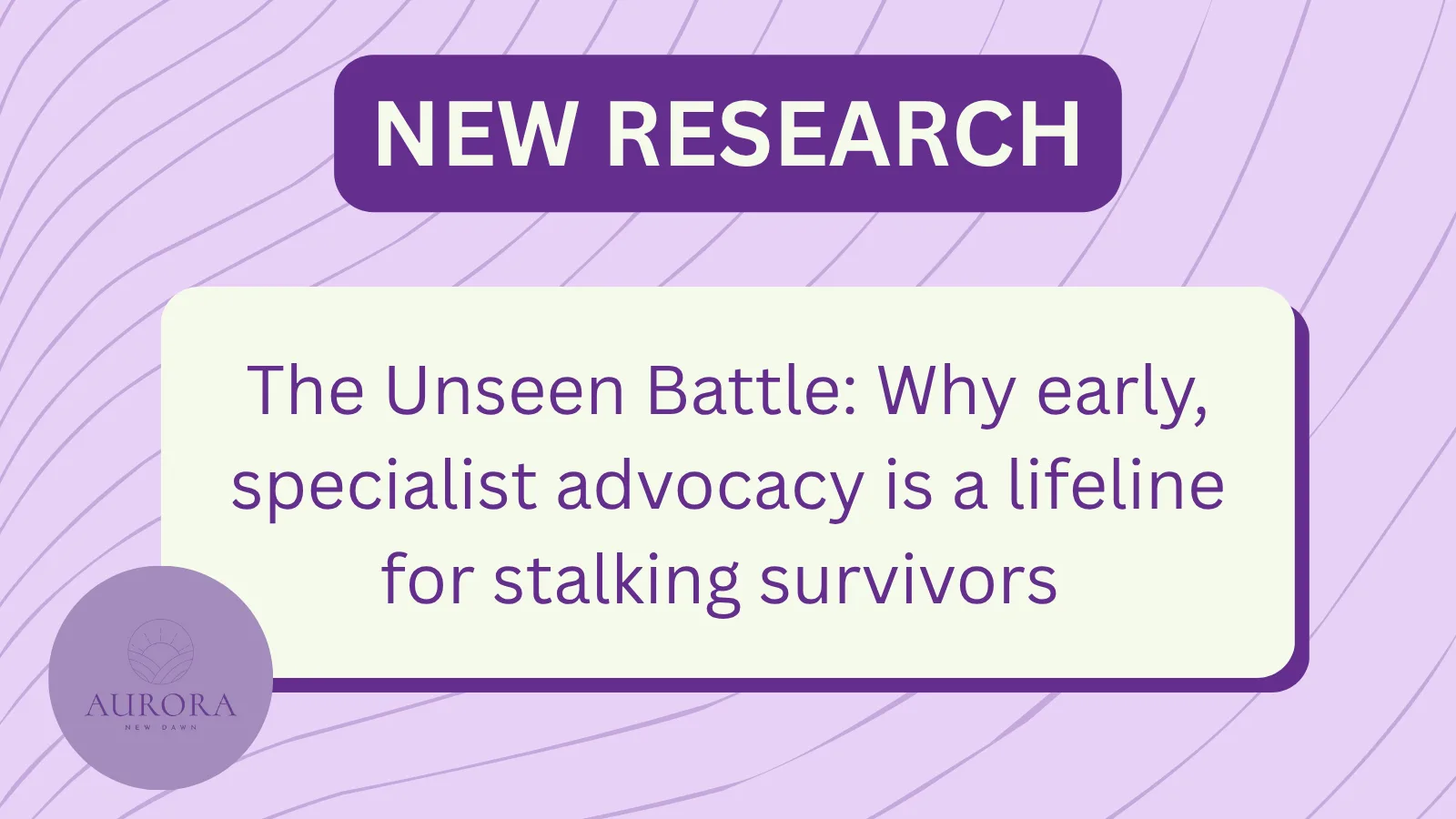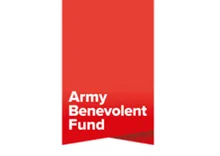
Stalking is a pervasive and profoundly damaging crime, often misunderstood and frequently underestimated; currently accounting for 40% of all Violence Against Women and Girls (VAWG) offences in the UK.1 The charity, Aurora New Dawn, through its team of Independent Stalking Advocate Caseworkers (ISACs), stands at the forefront of tackling this crisis by providing essential support and advocacy to survivors of stalking, domestic abuse, and sexual violence. Our core mission is to bridge the critical gap that frequently exists between victims and the complexities of the criminal justice system, offering crucial emotional support, advice and consistency throughout their ordeal.
Research was recently conducted by Buckinghamshire New University to explore the devastating, personalised impact of offline, online and technology-facilitated stalking on victims. Detailed below, it highlighted why specialist, tailored support from an ISAC is not just beneficial, but a necessity for achieving safety, recovery, and a feeling of being heard.
The Weight of Stalking: Trauma, hypervigilance, and mistrust
Stalking inflicts severe physical, psychological, and emotional trauma on survivors. Victims commonly report overwhelming fear, anxiety, hypervigilance, and intense mistrust. The emotional toll is profound and varied, meaning victims are never truly able to “clock off” from the constant sense of danger; whether that is offline, online or via technology in the home.
When victims first engage with ISAC services, their emotional state can be complex and challenging. Initial interactions may be met with suspicion, anger, and frustration. This anger is often not directed at the service, but is a natural trauma response stemming from the frustration and overwhelm caused by the situation and any perceived failure of the system to support them. It is paramount that victims have the space to “rant” and “get it off their chest”. This essential act of validation and ability to express themselves is often required before the victim can move on to practical safety or legal planning.
The requirement for emotional support faces further hurdles as building trust and rapport can take significant time. This challenge is particularly acute with male clients, who may feel they experience greater stigma when seeking emotional support. However, regardless of a survivor’s background, the ISAC’s ability to be consistently present and listen without judgment is vital for recovery and safety. For many, the ISAC becomes the only person who truly believes them.
The consequences of delayed intervention are starkly evident. Victims who may receive support late in the process—for instance, those referred through pathways like the Compulsive and Obsessive Behaviour Intervention (COBI)—often express immense anger and frustration that they were not helped earlier. The COBI referral pathway has been criticised for being “too late”. This late contact can be so triggering that some victims branded the belated support as an “insult” and found it too difficult to revisit the trauma. Early intervention and ring-fenced Government funding2 are thus identified as crucial for effective support.
The ISAC Solution: Tailored, consistent, client-led support
Recognising the highly personal nature of this crime, we understand that support must be client-led and entirely bespoke. The needs of survivors vary hugely, encompassing everything from practical support with housing, finances, or legal issues, to a fundamental need for emotional support and a safe space to express feelings. Safety plans must therefore be consistent and tailored to each victim’s specific needs and concerns:
· Individualised Assessment and Planning: Our service adheres to a rigorous process, with ISACs aiming for first contact with clients quickly with safety plans based on the victim’s individual risks. This is critical, as advice can range from basic steps like ensuring a mobile phone is fully charged or using safety applications, to complex technical advice on securing their online presence (with referrals to experts like The Cyber Helpline).
· Advocacy and Bridging the Gap: Our ISACs play a crucial role in bridging the communication gap between victims and the police. They manage victim expectations regarding the frequently slow pace of investigations (which might involve long waits for phone analysis) and proactively encourage police officers to maintain contact. This ensures victims are better informed and reassured throughout the often complex investigation process.
· Continuous Support: Our ISACs offer continuous support to victims right until the very end of the court case. This continuous emotional and practical accompaniment is vital during the trial process, which can be profoundly complex and scary for survivors.
Systemic Gaps: The landscape of silos
While the support provided by specialist advocates is tailored and effective, its effectiveness is frequently challenged by interagency working, which has been described as a “landscape of silos.”
· Communication and Information Barriers: ISACs can struggle to get timely responses from key agencies. This lack of coordinated action leaves victims feeling unsupported and at increased risk.
· Differing Priorities and Missed Opportunities: Police are often seen as prioritising investigations over victim support. This focus has occasionally resulted in officers missing opportunities to offer crucial ISAC services to victims. This suggests that dedicated victim support is not yet consistently at the forefront of operational thinking. The collection and processing of digital evidence also requires improvement for any criminal proceedings.
· Ineffective Coordination Forums: Even structures designed to improve coordination face challenges. Stalking Panels, intended for multi-agency risk management, are often heavily police dominated. ISACs are vital in these settings, ensuring the focus remains on the victim’s experience and needs.
Building a Unified Front: Positive steps in collaboration
Despite these persistent challenges, there are significant positive developments that validate the necessity and growing recognition of the ISAC role.
· Increasing Recognition and Training: Our ISACs are actively involved in training partners to fill knowledge gaps. Training delivered by ISACs to police officers, for example, has received “amazing feedback.” This training has led to concrete, positive shifts, including an increase in referrals and contact from police officers seeking help or guidance on stalking cases. The approval to deliver this specialised training across the entire Thames Valley area suggests the police recognise a knowledge gap and want us to fill it.
· Successful Partnerships: Effective collaboration does exist; our ISACs have wonderful relationships with some police officers who do a fantastic job for their victims, and note professional interactions with probation and other domestic abuse providers. Working relationships with other charitable organisations and the voluntary sector are good due to a mutual understanding that they each have their specialisms.
· Aspiration for Integration: There is a clear aspiration for systemic change. There is hope that the planned move towards the Multi-Agency Stalking Intervention Program (MASIP) model will improve multi-agency working. Furthermore, the findings of the National Stalking Super Complaint,3 which highlight the need for dedicated victim services and ISACs, are seen as crucial for encouraging other agencies to recognise the value of specialist victim advocacy. These concerns were addressed in the National Police Chief’s Council (NPCC) response4 this August but further countered by The Suzy Lamplugh Trust5 in September, indicating the work still to be done.
Conclusion: Prioritising the victim’s voice
The dedication of ISACs provides a crucial path to recovery, confidence, and safety for survivors of stalking. Victims attest to the profound value of this consistent, specialised help, stating that they could not have done this without us but to truly safeguard and support victims, profound and integrated system change is required:
· Early Referral: Agencies must ensure victims are referred to specialist ISAC services as early as possible to provide consistent support throughout the criminal justice process.
· Police response: Increased use of Stalking Protection Orders (SPOs) by police and the publication of annual police progress reports.
· Integrated Working: The move towards models like MASIP must be fully realised to establish genuinely integrated multi-agency collaboration, where information sharing on risk of harm is prioritised.
· The Victim’s Voice: The ISAC role is fundamental in multi-agency settings to ensure the victim’s experience and safety remain the primary focus.
· Personalised Victim Services: Additional specialist service delivery for ‘hard-to-reach’ victims such as children of stalking victims, male victims, victims of So Called Honour- Based Abuse (SCHBA) and victims of technology-facilitated abuse (TFA) is vital.
The tireless work of ISACs proves that when specialised support is provided early and consistently, victims can regain their sense of safety, potentially witness justice, and begin their journey towards recovery.
1 NPCC. (2025, August 1st). Progress made to improve police response to stalking. Retrieved from NPCC: https://news.npcc.police.uk/releases/progress-made-to-improve-police-response-to-stalking
2 Suzy Lamplugh Trust. (2025, September 25th). One year on from the Stalking Super Complaint findings: Demanding Police transparency, accountability and commitment. Retrieved from Suzy Lamplugh Trust: https://www.suzylamplugh.org/news/one-year-on-from-the-stalking-super-complaint-findings-demanding- police-transparency-accountability-and-commitment
3 Suzy Lamplugh Trust. (n.d). Super-complaint submitted on police response to stalking. Retrieved from Suzy Lamplugh Trust: https://www.suzylamplugh.org/News/super-complaint
4 NPCC. (2025, August 1st). Progress made to improve police response to stalking. Retrieved from NPCC: https://news.npcc.police.uk/releases/progress-made-to-improve-police-response-to-stalking
5 Suzy Lamplugh Trust. (2025, September 25th). One year on from the Stalking Super Complaint findings: Demanding Police transparency, accountability and commitment. Retrieved from Suzy Lamplugh Trust: https://www.suzylamplugh.org/news/one-year-on-from-the-stalking-super-complaint-findings-demanding- police-transparency-accountability-and-commitment







